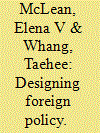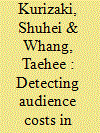|
|
|
Sort Order |
|
|
|
Items / Page
|
|
|
|
|
|
|
| Srl | Item |
| 1 |
ID:
134152


|
|
|
|
|
| Publication |
2014.
|
| Summary/Abstract |
The literature on economic sanctions has long studied sender countries' policymaking as a simple choice between imposing sanctions to extract concessions from the targeted country and doing nothing. We depart from this simplifying assumption and analyze sanctions as a multifaceted foreign policy instrument. We argue that senders design sanction policies in response to policy preferences of two domestic constituencies. Voters expect a response to an international dispute in the form of some policy, such as economic sanctions; hence, the sender's policymakers seek to demonstrate their competence in foreign affairs by imposing sanctions. Once the policymakers announce the use of sanctions, special interest groups that stand to experience economic losses when this foreign policy is implemented pressure the policymakers to choose sanction measures limiting such losses. As a result, the policymakers design sanction policies to include measures that will be less detrimental to special interest groups. We test our theoretical argument using the Threat and Imposition of Sanctions data and show that, while pressures from public opinion increase the likelihood of sanctions, special interest groups that benefit from the relationship with the target country are associated with a lower probability of the use of sanction measures that would impose substantial costs on domestic interest groups.
|
|
|
|
|
|
|
|
|
|
|
|
|
|
|
|
| 2 |
ID:
146146


|
|
|
|
|
| Summary/Abstract |
Selection effects in crisis bargaining make it difficult to directly measure audience costs because state leaders have an incentive to avoid incurring audience costs. We overcome this inferential problem of selection bias by using a structural statistical model. This approach allows us to estimate the size of audience costs, both incurred and not incurred, in international crises. We show that although audience costs exist for state leaders of various regime types, democratic leaders face larger audience costs than nondemocratic leaders do. Audience costs can be so large that war might be preferable to concessions, especially for leaders of highly democratic states. Audience costs also increase a state's bargaining leverage in crises because the target state is more likely to acquiesce if the challenge carries larger audience costs. We also find evidence that audience costs generate selection effects.
|
|
|
|
|
|
|
|
|
|
|
|
|
|
|
|
| 3 |
ID:
159327


|
|
|
|
|
| Summary/Abstract |
For the past two decades, North Korea has made a series of military provocations, destabilizing the regional security of East Asia. In particular, Pyongyang has launched several conventional attacks on South Korea. Although these attacks seem unpredictable and random, we attempt in this article to find some patterns in North Korean provocations. To this end, we employ a machine-learning technique to analyze news articles of the Korean Central News Agency (KCNA) from 1997 to 2013. Based on five key words (‘years,’ ‘signed,’ ‘assembly,’ ‘June,’ and ‘Japanese’), our model identifies North Korean provocations with 82% accuracy. Further investigation into these attack words and the contexts in which they appear produces significant insights into the ways in which we can detect North Korean provocations.
|
|
|
|
|
|
|
|
|
|
|
|
|
|
|
|
| 4 |
ID:
096691


|
|
|
|
|
| Publication |
2010.
|
| Summary/Abstract |
What is the relationship between international cooperation and the success of economic sanctions? Although it is commonly assumed that international cooperation is an important condition for the effectiveness of sanctions, empirical results have been mixed. We focus on the role of the sanctioned country's major trading partners and develop a theoretical model that shows how their actions can affect the probability of sanctions success by raising or decreasing resistance costs to the sanctioned country. We then derive hypotheses from the theoretical model and test them using fully structural estimation. The empirical results lend support to the theoretical expectation that the sanctioner is more likely to succeed if it has the support of the sanctioned country's major trading partners. We also find that international cooperation may be less crucial if sanctions are imposed by the sanctioned country's main trading partner because such sanctions have a higher probability of success.
|
|
|
|
|
|
|
|
|
|
|
|
|
|
|
|
| 5 |
ID:
106933


|
|
|
|
|
| Publication |
2011.
|
| Summary/Abstract |
Why do we observe economic sanctions despite strong doubts regarding their effectiveness? While the symbolic use of sanctions is advanced as an alternative to the instrumental use explanation, no one has assessed this alternative explanation empirically. I investigate the symbolic use of sanctions for domestic political gain in the United States, assessing in particular the effect of sanctions imposition on US presidential approval ratings. Findings suggest that policymakers benefit from imposing sanctions through increased domestic support. This domestic political gain can present policymakers with an incentive to use sanctions as a low-cost way of displaying strong leadership during international conflicts.
|
|
|
|
|
|
|
|
|
|
|
|
|
|
|
|
| 6 |
ID:
100391


|
|
|
|
|
| Publication |
2010.
|
| Summary/Abstract |
When are economic sanctions expected to succeed? Previous studies predict that sanctions will be more effective when the issue at stake is important, when the sender and target are allied, when the target's domestic institutions are more democratic, and when the target's economy is dependent on the sender's. This article subjects these explanations to an empirical test using a new fully structural estimation that employs a game theoretic model as a statistical model. The initiation and outcomes of sanctions are incorporated with the strategic behaviors of sender and target states into a unified model. The model improves upon extant models by allowing the initial choice of the sender states to be multiple, not binary. This non-binary option enables the sender states to opt for the optimal intensity level of sanctions. Findings suggest that issue salience is positively associated with the decision to impose sanctions, but not necessarily with their effectiveness. Further, allied targets tend to comply even when they can win a sanctions contest, while non-allied targets tend to resist even when they know that on average the sender is likely to continue sanctioning in the face of resistance. Since sanctions imposed from 1903 to 2002 take place disproportionately between non-allied dyads, and thus belong to the category of sanctions most likely to fail, we can begin to understand why sanctions have such a low success rate.
|
|
|
|
|
|
|
|
|
|
|
|
|
|
|
|
|
|
|
|
|